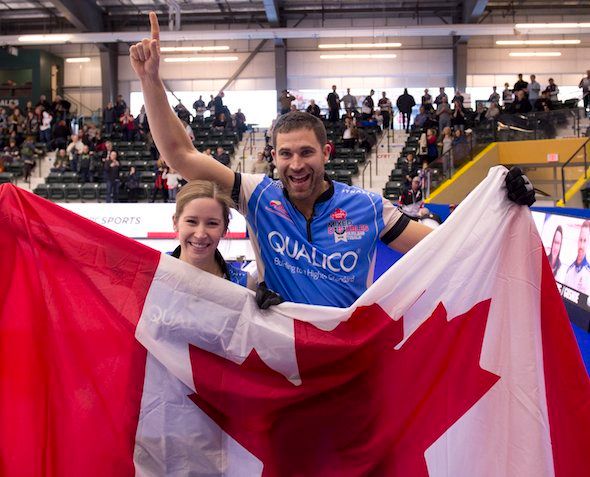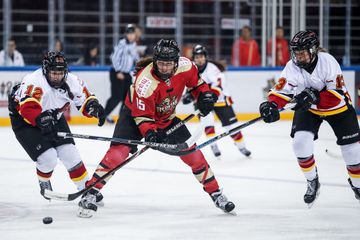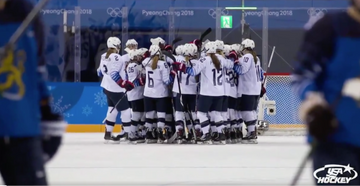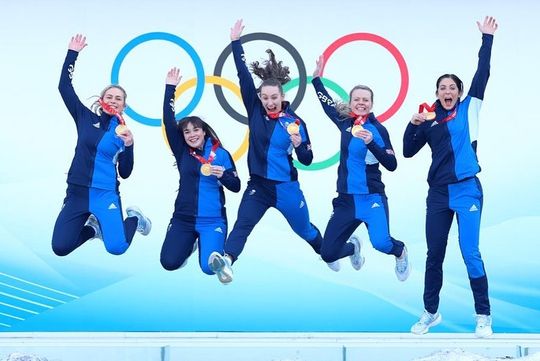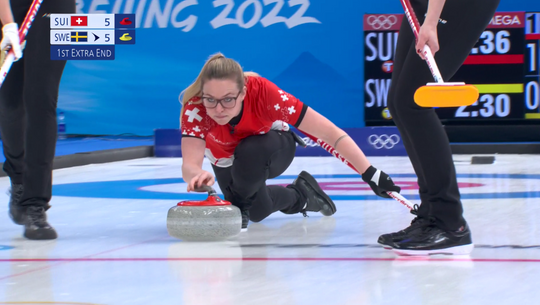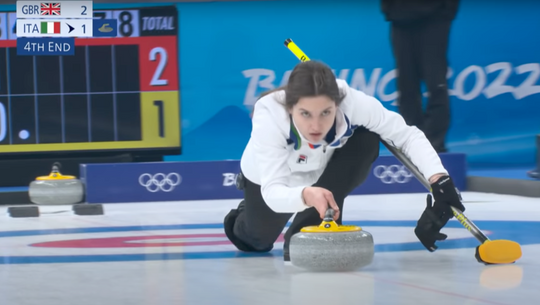After four round robin draws, the mixed doubles curling field is evenly divided between playoff contenders (Canada, Norway, Olympic Athletes from Russia, and Switzerland) and those in danger of being eliminated (South Korea, China, USA, and Finland). (Check out the full results here.)
Canada and Norway opened the competition with a back-and-forth game that highlighted the experience of the Norwegian team and the relative newness of the Canadian team in the mixed-doubles event. At any event, each team needs to read the ice and learn the stones; in addition, Canada's John Morris and Kaitlyn Lawes are still developing their playing relationship, a disadvantage when facing a squad who have been together for five season. Morris struggled noticeably (especially with his weight) in the second half of Canada's first draw, missing three key shots and curling just 63% on takeouts during the game. While both Morris (80%) and Lawes (72%) outcurled their more experienced counterparts, Magnus Nedregotten (79%) and Kristin Skaslien (61%) were able to pull out the victory primarily because of two excellent takeouts by Skaslien. In particular, Skaslien's takeout in the second end, to remove the Canadian shot stone and count three for Norway, was highlight-worthy. She followed that up with a key shot that allowed Norway to steal two in the eighth for the win after Lawes missed a tap to force extras.
If Lawes and Morris do make it to the playoffs, they might look back on the fifth end of their second game against the Americans as the turning point of their tournament. After four ends of trading single points, Morris' triple takeout in the fifth not only earned three points and was the crucial shot in Canada's first victory, but seemed to give Morris, who had struggled to that point, confidence. He curled 92% against the Americans and was exceptional in the second half of the game.
Canada's second day on the ice went much more smoothly, and the duo looked like medal contenders with an easy 10-4 victory over China in seven ends and an 8-2 win over Finland in six ends. Despite outplaying the struggling Finnish team (Oona Kauste curled just 31% and the pair likely would have run out of time had the match gone the full eight ends), the Canadians were only able to take single points in the first, third, and fourth ends, until Lawes, who's had a strong tournament so far, successfully drew for five in the sixth end.
I expect to see Lawes and Morris compete for a medal in this event. I've been impressed with how quickly they've improved so far (in terms of communication and ice reading) and they're quickly becoming dominant. Lawes ranks second among women, curling at 74% and Morris is second among men at 82%. The pair have the best point differential of the eight teams at +11 and have scored three or more in an end five times, the most of any team, while surrendering three only once. They're beginning to look like the team to beat.
Despite a commanding 9-3 victory in their first draw against the Olympic Athletes from Russia, in which the Americans twice stole points, the Hamilton siblings -- Matt and Becca -– are in tough to make the playoffs after three consecutive losses. Through the first two draws the pair had strong individual numbers: Becca curled 85% against OAR, and 81% against the Canadians, while Matt curled 81% and 80% respectively, and they kept things close against the Canadians until Morris' triple takeout. A similar pattern emerged when the Hamiltons faced Switzerland in draw three. A low scoring affair, the Americans led 3-1 after four and took a 4-3 lead to the eighth end. Becca's difficult game (she curled 69%) cost the pair points in the sixth and seventh ends. The duo imploded and were visibly frustrated in the eighth, giving up six and taking the loss.
Things went from bad to worse for the siblings when they played South Korea. Behind from the start, Becca curled a 65% and Matt curled a 43% in a 9-1 drubbing. It's not all bad for the Americans, Becca is leading the way for the women's field, curling at 75% through four draws. Unfortunately, she's trending down –- her curling percentage has dropped each game for a total of 20 percentage points from game one to four. If things continue to go poorly, the duo might shift focus to preparing for their upcoming men's and women's competition.
Jenny Perret and Martin Rios of Switzerland are the defending world champions (Rios also claimed a world title in in 2012) and look destined for the medal round. The pair secured three straight victories before registering their first lost in a nail-biter to Norway, 6-5, though Perret, who curled 81%, put in a strong performance. The Swiss team has stolen seven ends so far and is keeping pace with Canada and Norway with a +7 points differential.
Norway's team are also strong playoff contenders. As impressed as I have been with Canada's performance so far, Norway has shown they have the ability to take gold. After beating the Canadians in their opening match, the team lost 4-3 to OAR before winning 8-3 against South Korea and 6-5 Switzerland. Magnus Nedregotten and Kristin Skaslien are well-positioned to run the table in their remaining draws, with Finland, the United States, and China -– all with 1-3 records –- still to come. In addition, Nedregotten is putting in a gold-medal worthy performance, curling at 84% through four draws (leading the men's contingent) and the pair have the second-best point differential at +8. Look for them in the playoff round.
Of the four teams with 3-1 records, Olympic Athletes from Russia have looked the least impressive. They have a negative points differential (-2) and have relied on Anastasia Bryzgalova to keep the team afloat (curling 72% through four draws, third among women). Alexander Krushelnitckii has curled 62% through four games, by far the worst average among the men, though he has improved his play with each game. If OAR are to win their remaining games, it's imperative his game continues its upward trajectory.
While it's still early in the competition, so far the power play (when the positioned stones are moved to either the left or right side, with the stone in the house moved to the edge of the 8-foot circle and the guard stone correspondingly moved to protect the in-house stone) has been a mixed bag for the team with hammer. Designed to increase scoring, the Swiss were able to steal against the American power play in the sixth end of their match when Becca Hamilton's draw to the button was heavy. However, the Swiss used their power play to great success in the same game, placing all six of their shots in the ring, scoring six and the win. The feat, known as a "six-ender" was the first perfect score in Olympic curling history.
The round robin games resume tonight at 7:05 PM Eastern time, and conclude with more sessions Saturday at 7:05 PM Eastern time, though there may be tiebreaker sessions scheduled afterwards. Check the complete curling schedule here, and we will bring you more coverage as the tournament progresses.
